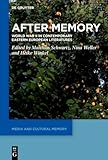After Memory : World War II in Contemporary Eastern European Literatures / ed. by Matthias Schwartz, Nina Weller, Heike Winkel.
Material type: TextSeries: Media and Cultural Memory ; 29Publisher: Berlin ; Boston : De Gruyter, [2021]Copyright date: ©2021Description: 1 online resource (VII, 479 p.)Content type:
TextSeries: Media and Cultural Memory ; 29Publisher: Berlin ; Boston : De Gruyter, [2021]Copyright date: ©2021Description: 1 online resource (VII, 479 p.)Content type: - 9783110713732
- 9783110713879
- 9783110713831
- 809.935810947 23/eng/20230216
- online - DeGruyter
- Issued also in print.
| Item type | Current library | Call number | URL | Status | Notes | Barcode | |
|---|---|---|---|---|---|---|---|
 eBook
eBook
|
Biblioteca "Angelicum" Pont. Univ. S.Tommaso d'Aquino Nuvola online | online - DeGruyter (Browse shelf(Opens below)) | Online access | Not for loan (Accesso limitato) | Accesso per gli utenti autorizzati / Access for authorized users | (dgr)9783110713831 |
Frontmatter -- Contents -- After Memory: Introduction -- Growing in the Cracks: On Ecologies of the Margins -- I Imaginary Adoptions: Family Histories and Personal Legacies -- Bodies of Evidence: Memory, the Forensic Imagination and Family Histories about former Yugoslavia -- Transnational Aspects of Postmemory in Third-Generation Fiction: The ‘Contrapuntal’ Cases of Piotr Paziński and Erwin Mortier -- Ghost-Writing World War II Memories: Romanian Holocaust Survivors’ Life Stories in Post-Cold War Western Societies -- Legacies of Stalinism and the Gulag: Manifestations of Trauma and Post Memory -- II Revisionist Appropriations: National Belongings and Collective Identities -- Is the Past a Secret Language? The Jewish Other and the Holocaust in Iurii Vynnychuk’s Novel Tango of Death -- Post-Imperial Resentments: Alternative Histories of World War II in Popular Post-Soviet Speculative Fiction -- Chetniks and Partisans: Conflicting Narratives in Contemporary Serbian Literature -- Delectatio Morosa: Reflections on Affective Compensation, Conflation, and Fantasy in Polish Memory Culture -- III Fictional Interventions: Alternate Narratives and Subverted Mythologies -- ‘Spectral Stories’: Fictional Re-Inventions of the Holocaust in Contemporary Polish Literature -- Counterfactuals and (Counter)memory: Im/possible Modes of ‘Undoing’ the Great Patriotic War -- The ‘Gift of Memory’ and the ‘Gift of Oblivion’: Holocaust and World War II in Contemporary Hungarian Literature -- De-Mythologising History: On the Fictional and Phantasmatic Dismantling of the Leningrad Blockade Narrative -- IV Imaginative Reconfigurations: Average Heroes and Ambivalent Subjectivities -- Digging up Skulls, Fighting with Words: On Radka Denemarková’s Novel Money from Hitler -- Layers of the Crypt: Baltic Women’s Postmemory of World War II in Life Stories and Fiction -- Bridging the Gaps: The Poetics of Postmemory in the Czech Graphic Novel Alois Nebel -- Obsessed with the Past: On the Topicality of the Historical Novel in Eastern Europe Today -- Appendix -- Acknowledgments -- Notes on Contributors -- Index
restricted access online access with authorization star
http://purl.org/coar/access_right/c_16ec
Even seventy-five years after the end of World War II, the commemorative cultures surrounding the War and the Holocaust in Central, Eastern and South Eastern Europe are anything but fixed. The fierce debates on how to deal with the past among the newly constituted nation states in these regions have already received much attention by scholars in cultural and memory studies. The present volume posits that literature as a medium can help us understand the shifting attitudes towards World War II and the Holocaust in post-Communist Europe in recent years. These shifts point to new commemorative cultures shaping up ‘after memory’. Contemporary literary representations of World War II and the Holocaust in Eastern Europe do not merely extend or replace older practices of remembrance and testimony, but reflect on these now defunct or superseded narratives. New narratives of remembrance are conditioned by a fundamentally new social and political context, one that emerged from the devaluation of socialist commemorative rituals and as a response to the loss of private and family memory narratives. The volume offers insights into the diverse literatures of Eastern Europe and their ways of depicting the area’s contested heritage.
Issued also in print.
Mode of access: Internet via World Wide Web.
In English.
Description based on online resource; title from PDF title page (publisher's Web site, viewed 25. Jun 2024)


